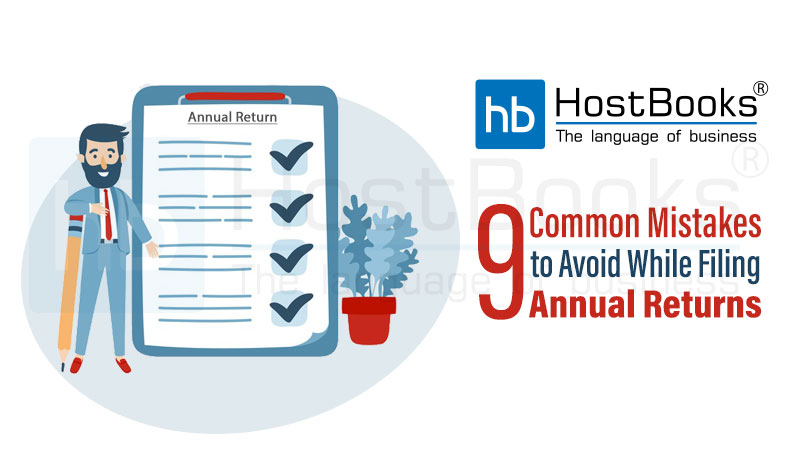9 Common Mistakes to Avoid While Filing Annual Returns

The due date for filing GSTR-9 for the financial year 2018-19 is December 31, 2019. A taxpayer should be extra cautious to avoid making any errors because once filed, GSTR-9 does not allow any correction to be made. It is required to be filed once every year by all registered taxpayers and also the government is going to be vigilant to flag the defaulters. Due to the pressure of filing returns on time, anyone can accidentally commit errors which could prove costly for taxpayers. If you are also filing your GSTR-9, following are some of the most common mistakes that you should watch out for.
Mistake#1: Not Filing GST Annual Return on Time
To steer clear of late fees and also avoid penalties, a taxpayer needs to file their GST returns prior to the deadline. Even more troublesome can be the demand notice or prosecution that may ensue when the annual return is not filed on time. Additionally, the reconciliation done while filing returns might also reveal possible tax discrepancies between GSTR and books of accounts. Hence, huge penalty and interest can be saved with timely reconciliation and filing of annual returns.
Mistake#2: Not Ensuring a Separate GSTR-9 for each State/ Union Territory
If you are doing business in two or more than two states, you may have multiple GSTIN. As GST returns are filed on the basis of GSTIN held by a business, you will have to file separate GSTR-9 for each state and union territories, as opposed to entire company or business as a whole.
Mistake#3: Reporting Data for April-June 2017 While Filing GSTR-9
GST was implemented in India on July 2017. Accordingly, GSTR-9 filing should be done for only 9 months and not for the entire year. Hence, taxpayers need to prepare annual return by reporting transactions for FY2017-18 with data of 9 months i.e. July 2017 – March 2018.
Mistake#4: Incorrect Reporting in Monthly and Quarterly Returns
It is crucial to match all the data reported in monthly and quarterly returns with the annual return. Even the smallest bit of mismatch could lead to your GSTR-9 being rejected and getting a demand notice from the GST department on a later date. The answer is to match your annual return with every GSTR-1 and GSTR-3B filed.
Mistake#5: Improper Documentation
In recent times, there have been many cases of businesses getting punished by the government for fake invoices. Therefore, while filing your tax return, make sure to reconcile, verify, and report only accurate information. Apart from this, the taxpayer should also ensure that there is substantial documented proof of all the data reported in the return. This, in turn, helps you to avoid any kind of unnecessary issues at a later date.
Mistake#6: Not Segregating Details in the Anual Return
The GST annual return demands bifurcation of data across various fields such as HSN codes, input field credit, refunds, and more. These kinds of specific details are not required while filing monthly or quarterly returns. So, you might have to go through the book of accounts to find and report this data in GSTR-9 in an accurate manner.
Mistake#7: Not Getting Audited When Turnover is Above INR 2 Crores
Unlike previous indirect tax laws, GST has introduced a new legal requirement for businesses – GST Audit. A business whose turnover exceeds INR two crores needs to get their books of accounts audited by either a Chartered Accountant or a Cost Accountant. In addition, they need to prepare a reconciliation statement between the audited financial statements and the annual return needs to be furnished in the form of GSTR-9C.
Mistake#8: Not Filing Nil Return
It is mandatory for all registered taxpayers to file an annual return until and unless their GST registration is canceled. Even if there has been no transaction during a financial year, a NIL return needs to be filed.
Mistake#9: Not Declaring Additional Liabilities
The taxpayer may have differences of sales which were never been reported in GSTR-1 and GSTR-3B filed yet but appearing in books of accounts. In such a case, the taxpayer is required to declare such additional liability in GSTR-9 and pay the additional tax in DRC-03.
Conclusion
Therefore, it is essential for all taxpayers to file their annual returns regularly and in a proper manner. This can help businesses to comply with GST laws and stay more focused on their core business.

Try HostBooks
SuperApp Today
Create a free account to get access and start
creating something amazing right now!














